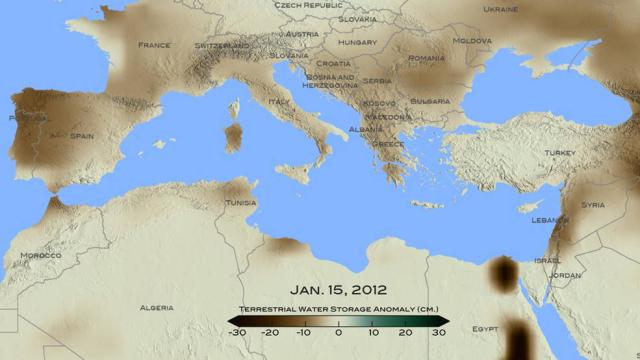A new NASA study found that a drought that ended in 2012 was the worst in nearly a millennium for a huge swath of the planet.
That sobering stat comes from a new NASA study that was released yesterday, which focused on the eastern Mediterranean Levant region: Cyprus, Israel, Jordan, Lebanon, Palestine, Syria and Turkey. The agency found that the drought that lasted from 1998 to 2012 was the region’s driest drought in 900 years. And its cause is likely linked to human-fuelled climate change.
For this study, NASA looked the region’s drought history by looking at the rings in its trees: Thinner rings mean dry spells, while thicker ones suggest more water-filled years. The idea was to study drought patterns over time, which could help scientists tell the difference between naturally occurring droughts, and weird outliers made worse by humans.
So NASA wrangled tree ring records from living and dead European trees, as far west as Spain. They also consulted tree-ring records from the Old World Drought Atlas. Using this data, the team was able to reconstruct natural drought patterns over the last millennium in the region. The findings were published in the Journal of Geophysical Research-Atmospheres.
After some history sleuthing, NASA was able to corroborate the tree-ring data with historical documents to confirm the drought patterns between the years 1100 and 2012. The most depressing finding? The eastern Mediterranean drought from 1998 to 2012 was 50 per cent drier than the driest period in the last 500 years, and up to 20 per cent drier than the harshest drought of the past 900 years.
In the NASA press release, Yochanan Kushnir, a climate scientist at Lamont Doherty Earth Observatory not involved in the research, said:
The Mediterranean is one of the areas that is unanimously projected [in climate models] as going to dry in the future [due to man-made climate change]. This paper shows that the behaviour during this recent drought period is different than what we see in the rest of the record.
The fact that the huge region’s worst drought happened in a very tiny window of just 14 years out of a possible 900 is extremely worrying. Even more disturbing is that those 14 years ended just four years ago. And the scariest thing of all, the study suggests? Harsh weather due to climate change isn’t a way’s off — it’s already happening.
Image: NASA/Goddard Scientific Visualisation Studio
